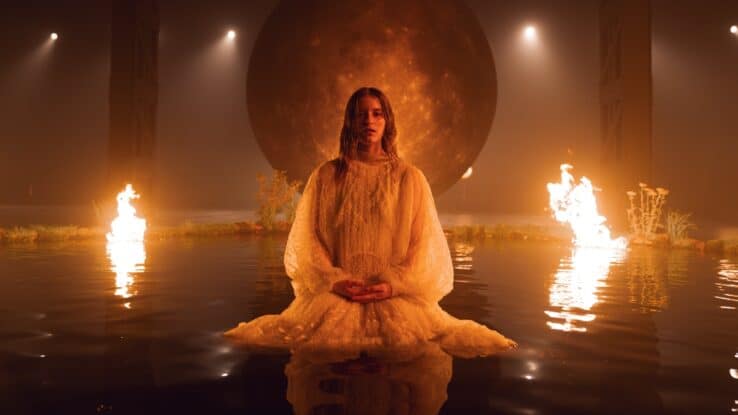Interview

Interview
Paris Paloma: “Women shouldn’t have to be angry”
The singer-songwriter talks ‘Labour’, feminine rage, and her debut album
TikTok music gets a bad rap. For all the repurposed nursery rhymes and algorithm-pandering choruses, there are many songs that blow up on the app simply because they speak to a shared experience. When a song takes off on social media these days, it isn’t just because people like it, but because they feel compelled to post themselves passionately singing along. Such was the case with Paris Paloma’s ‘Labour’, a rallying cry against a system in which the invisible workload carried by half the population often goes unnoticed. ‘Labour’ made women feel seen. They shared the song amongst themselves. A year after the song’s original release, Paloma put out ‘Labour – The Cacophony’, in which she is backed by a choir of angry, newly energised voices. The single made clear that Paloma had not just found an audience, but built a rock solid community. A debut album was only a matter of time.
“I think a debut album always feels like it has been a long time coming from what I hear from other people,” says Paloma. “And also, I think it’s in my nature to be quite impatient, creatively, and to want stuff to just be out, for people to experience it.”
We’re speaking less than a month out from the release of Cacophony, which arrives in the world on 30 August. The weekend before, Paloma will be playing Reading & Leeds Festival for the first time (she “never did the end of school right of passage” she says, but she’s “heard lots of good things”). Her Reading & Leeds set promises what her live performances always do – unity, community, collective feeling. Some may claim that social media is ruining music, but Paloma makes a pretty good case for the opposite.
What was your relationship with music like growing up?
I just sort of listened to what my parents had on when I was a kid. My mom listened to a lot of songwriters, a lot of Burt Bacharach and Eva Cassidy and Roberta Flack, and then a lot of soul and Motown. Then when I was 12 or 13, I started independently discovering singer songwriters like Joni Mitchell and Ed Sheeran at the time – his album + came out and blew my mind. That’s when I got into guitar playing, which facilitated my songwriting.
What was it that drew you in a folk-influenced direction?
I think it was just the directness of being able to get stories across in that way. There’s not a lot in-between the listener and the speaker. Growing up in a very rural setting, it felt really fitting. It’s like this starting place for the stories I wanted to tell.
That village setting is very present in a lot of your earlier singles. Is that something that you still feel is part of your music?
I think it will always inform my music. There’s a song on the new album which I’d see as almost like a sister song with ‘Village Song’ which is one of my really old singles. I don’t think it leaves you. It’s nice in that way. It kind of runs this thread throughout the past and the present and then stuff I’ll make in the future.
You saw quite a lot of early success with a cover of a Rainbow Kitten Surprise song called ‘It’s Called: Freefall’. What drew you to that song?
I just loved it. When I do covers, it’s generally just because I love a song so much I want to consume it, and because you can’t eat a song, the closest thing is singing it out through you and making it into your own thing. It’s kind of a cannibalistic procedure. I just loved it so much. I love Rainbow Kitten Surprise. That song gave me so much joy and elation. That was a really funny moment for me, when that cover sort of blew up. And now it’s very funny as well, because it drew in very different demographics to my own audience. There’s like two different kinds of listeners that I have, and one kind is from that cover, and the rest is just from the rest of my discography. A lot of people thought it was my original, but it’s a joy to redirect them to Rainbow Kitten Surprise. I didn’t think that that was going to happen when I just made a cover of it. I used to make covers all the time and that was the only time that happened.
Your artwork for most of your singles is hand-painted or drawn. When you’re creating a cover for a single or an album, what’s your process?
I kind of just approach it like illustration, as opposed to wanting to create a fine art piece that’s married to the song or the album. I just want to create something that embodies the tone and embodies what I’m trying to convey, but it’s lovely, and it can be a very meditative process, because you kind of need to distill everything that the song or the album is.
It’s all tools, isn’t it, to help convey something. If you can do that in multiple facets, then it’s more accurately conveyed. That’s one of the reasons I enjoy it so much. When you’re a creative it does feel like you’re inviting someone into your world, so that’s why you either want to portray that in all the ways you possibly can, or work with people who are very close to you, who you can share that world with, and who can execute your vision. In the future, I’m sure I’ll work with other wonderful cover artists. I don’t think I’ll always do my own cover art, because it is very time-consuming and it does put walls on what I’m able to do. But it was important to me to have it as a tradition for the debut, because it is the first time that people are entering my world.
Let’s talk about ‘Labour’. Where did that song begin?
I started writing it in August of 2022 I think, and then went to LA and brought some songs that I’d written to Justin Glasco, and we worked on them in the studio and he produced them. That was when it was conceptualised, but I had no clue that it was going to have that kind of response. It was really humbling. In no way could I have prepared for it. It was a big part of deciding to do an album, to follow on from that. At the time, I was just releasing singles to build my discography and my world, but I’m really glad that it went in the direction it has.
What was that like, to experience that response to ‘Labour’?
It was really overwhelming. Again, no one can prepare you for it. But it was also really moving, hearing the way in which it resonated with people, the way in which it empowered people, both men and women, to make changes in their lives. I can’t even take credit for that, and I think it’s one of the most wonderful things – women from different backgrounds, intersectionally, using it as a facilitator to share their experiences. There were women from so many different levels of privilege, sharing experiences that I don’t have as the writer of that song, and that’s such a high honour, I think, when people are able to use something you’ve made to help other people better understand them.
The comment sections of videos using that song and the music video itself are really interesting spaces, because they’re full of people sharing their stories, like you say. Does that ever feel overwhelming, being the host of that space?
It depends on the depth of the comments. Prior to ‘Labour’ being released, I had another single called ‘The Fruits’, which is not related to this album, but came out a couple of years ago, and that was my first time experiencing a song kind of blowing up in that way. ‘The Fruits’ has themes of sexual violence. I really, really appreciate the vulnerability of my audience, but there’s always elements of parasocial things, where you do feel the weight of people’s messages to you, especially when they’re these incredibly heavy things to wake up to from people you don’t know. But, for the most part, all of the messages I receive are immensely respectful and kind and simply just to let me know the effect that ‘Labour’ has had on their lives, in empowering them.
‘Labour – The Cacophony’ really felt like the culmination of all of that. What was that like, putting that project together?
Amazing. It felt like such a natural progression from ‘Labour’s first release, and its intention was always just to be a thank you to everyone who was part of that first moment around ‘Labour’. I wanted to put their voices back in the song, and also to reflect the atmosphere of the live show where everyone sings along to it.
What was the process like of putting this album together off the back of that moment?
Really fun. It was really amazing and exciting to think about what I wanted to convey beyond just the lens of ‘Labour’. Because, obviously, ‘Labour’ is immensely important, but it is one facet of the music that I write and the stories that I feel the need to tell. I feel like the album is really varied in tone and story and mood. It tells the story of my recovery and my journey. I was really excited for it to be out.
Your music has been quite heavily associated with the idea of ‘feminine rage’ online. Do you consider your music to be angry?
I wouldn’t say I take exception to the phrase feminine rage – I think there’s a reason that it’s become this empowering thing for a lot of women. But I think sometimes it can be quite overused, and it can also feel quite isolating for certain communities of women, because I also think the ability to display feminine rage is not a privilege that all women have. It can be quite a white feminist thing, whereas women of colour don’t have that privilege in order to be respected. A lot of the time, exhibiting rage or exhibiting anger would result in them being written off.
It’s been a phrase so closely attached to what happened with ‘Labour’, so I’ve given it a lot of thought. I think there is something empowering about letting women be angry and allowing them to show that. But I would say that shouldn’t stop at anger, and neither does my music. I wouldn’t say that my music comes from a place of anger. Typically, it comes from a place of just deep feeling, and all the songs on the album span a range of different emotions.
The last thing I’d say on female rage is that I’ve always felt it does a slight disservice to womanhood, because women shouldn’t have to be angry. The presence of anger linked to womanhood is the result of injustice and the result of mistreatment and exploitation, and those are not things that are attached to women. Those are things that are attached to the patriarchy. I am so grateful for the empowerment that people have found in ‘Labour’, and that people find in the phrase [feminine rage] as well. But I think whenever you have a song like ‘Labour’, and when phrases that you didn’t coin yourself become attached to it, it always spurs a lot of thought about it.
There are definitely ‘trends’ in online feminism and it’s interesting how your music has, at different points, become associated with different movements and moments online. Is it something you’re ever conscious about as you’re writing?
Not really. A lot of the time, I think my writing feels like it exists in a bit of a bubble. I’m very solitary when I’m writing. It doesn’t feel like there’s other people in my mind at the time. Maybe there should be. I do think it happens more now than it used to. I used to feel completely like I wrote in an incubator and released the music into a void. Whereas now I am aware that it will go to an audience who is really attentive and really thoughtful and ready for it. But I wouldn’t say it’s something that I intend or plan for when I’m writing.
Which song on the album was hardest to write?
Probably ‘The Warmth’, because I really struggle writing happy songs, but I needed to write that one, and I had been thinking about it for a while. I had some kind of starting points in my head, but it wasn’t really happening. I’m not used to writing uplifting and happy things because that feels almost more vulnerable sometimes. When you’re happy, you don’t feel like writing about it. You feel like experiencing it.
Why do you say it’s more vulnerable?
It’s funny, I say that, but I don’t know why I say that. But that’s how I feel about exhibiting joy. It’s like coming out of a cave after a period of darkness. There is a strength in the acknowledgement of pain and the acknowledgement of anger, and I think there’s this fear that the acknowledgement of joy and your growth and your happiness is not something that would interest people as much. Maybe that’s where the vulnerability comes from.
Which unreleased song are you most excited for people to hear?
I’m really excited for people to hear ‘Bones On The Beach’. There was going to be a moment where that was going to be a single and it didn’t end up being one, so I think that’s why I’m ready for people to hear it. I’m excited for everyone to hear every song.
You’ve said previously that the title of the album, Cacophony, is partly inspired by Stephen Fry’s Mythos. What is it about Mythos and mythology in general that ties in with this record?
I was just reading the first chapter of Mythos, and it’s called ‘Out Of Chaos’. It’s this idea of creation springing from the Greek creation myth of chaos, which he describes as a yawning chasm of noise and darkness, and that’s what the inside of my head felt like a lot of the time when writing these songs. This album is the story of the journey out of that, to where the inside of my head nowadays feels a lot more bearable, even though the journey is not at an end and it never will be. All these things that I’ve dealt with in my life – depression, OCD, anxiety, trauma, all these inflictions of pain – music is such a coping mechanism for all of it, and that’s kind of the point of the whole album. Cacophony is in reference to that chaos, and the point at which creation comes from that.
Cacophony will be released 30 August, available to pre-order here









